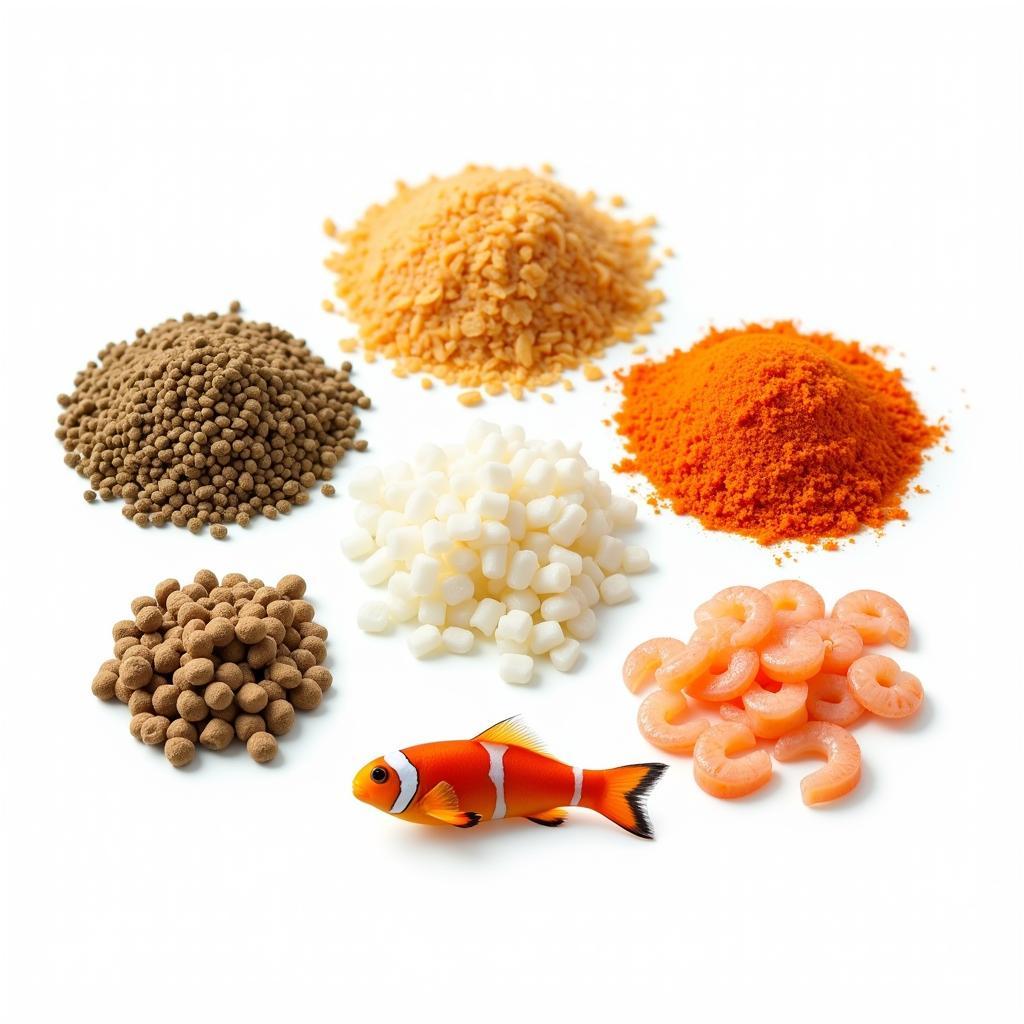Clownfish, with their vibrant colors and playful personalities, are a popular choice for aquarium enthusiasts. Providing the Best Food For Clownfish is crucial for their health, vibrancy, and overall well-being. This guide dives deep into the dietary needs of clownfish, offering you everything you need to know to keep your Nemo thriving.
Understanding Clownfish Nutritional Needs
Just like us, clownfish require a balanced diet to stay healthy. Their diet in the wild consists primarily of algae, small invertebrates, and plankton. Replicating this variety in your home aquarium is key to keeping your clownfish happy and healthy. A varied diet provides essential vitamins, minerals, and proteins crucial for growth, disease resistance, and vibrant coloration.
Essential Nutrients for Clownfish
Protein plays a vital role in building and repairing tissues, ensuring healthy growth, and maintaining a robust immune system. Look for food sources rich in marine proteins, such as mysis shrimp, brine shrimp, and krill. In addition to protein, essential fatty acids like Omega-3s contribute to healthy skin, vibrant coloration, and overall well-being.
Vitamins and minerals are also essential. While some of these are obtained through the food they eat, supplementing their diet with vitamin-enriched foods can further boost their immune systems and overall health. Remember, a well-nourished clownfish is a happy and vibrant clownfish!
Types of Food for Clownfish
Choosing the right food for your clownfish can seem daunting, given the variety of options available. From food for clownfish flakes and pellets to frozen and live foods, there’s something to suit every clownfish’s palate and your aquarium setup.
Flakes and Pellets: Convenient and Nutritious
Flakes and pellets are a popular choice due to their convenience and affordability. High-quality best fish food flakes and pellets are formulated to provide a balanced diet, containing essential vitamins, minerals, and proteins. Look for formulas specifically designed for clownfish or marine fish.
Frozen Foods: A Boost of Natural Nutrition
Frozen foods, such as mysis shrimp, brine shrimp, and krill, offer a closer representation of a clownfish’s natural diet. These options provide a higher concentration of protein and essential nutrients compared to flakes or pellets. Be sure to thaw the food completely before feeding to avoid digestive issues.
Live Foods: Stimulating Natural Hunting Instincts
Offering live foods occasionally can stimulate your clownfish’s natural hunting instincts and provide a varied diet. Suitable live foods include brine shrimp, copepods, and small amphipods. However, be mindful of the source of live foods to prevent introducing parasites or diseases into your aquarium.  Different Types of Clownfish Food
Different Types of Clownfish Food
Feeding Schedule and Portion Control
How often and how much you feed your clownfish is just as important as what you feed them. Overfeeding can lead to water quality issues, while underfeeding can result in malnutrition.
Establishing a Feeding Routine
A good rule of thumb is to feed adult clownfish twice a day, offering small portions that they can consume within a few minutes. For juvenile clownfish, more frequent feedings, three to four times a day, are recommended to support their rapid growth. Observe your clownfish’s eating habits and adjust the feeding schedule and portion sizes accordingly.
“Establishing a consistent feeding routine not only benefits your clownfish’s health but also helps maintain a stable aquarium environment,” advises Dr. Amelia Reed, a marine biologist specializing in clownfish care.
Avoiding Overfeeding
Overfeeding is a common mistake among aquarium owners. Uneaten food can decompose, leading to ammonia spikes and deteriorating water quality. “Always remove any uneaten food after a few minutes to prevent water quality issues,” recommends Dr. Reed.
Conclusion: Nourishing Your Clownfish for Optimal Health
Providing the best food for clownfish is a vital aspect of responsible aquarium keeping. By understanding their nutritional needs and offering a varied diet consisting of high-quality flakes, pellets, frozen and occasional live foods, you can ensure your clownfish thrive in their aquarium environment. Remember, a healthy diet translates to a vibrant, active, and happy clownfish.
FAQs
- What is the best food for clownfish fry?
- How often should I feed my clownfish?
- Can I feed my clownfish only flakes?
- What are signs of overfeeding in clownfish?
- How do I introduce new foods to my clownfish?
- Can I feed my clownfish human food?
- What should I do if my clownfish refuses to eat?
Need further assistance? Contact us! Phone: 02437655121, Email: minacones@gmail.com Or visit us at: 3PGH+8R9, ĐT70A, thôn Trung, Bắc Từ Liêm, Hà Nội, Việt Nam. We have a 24/7 customer support team.